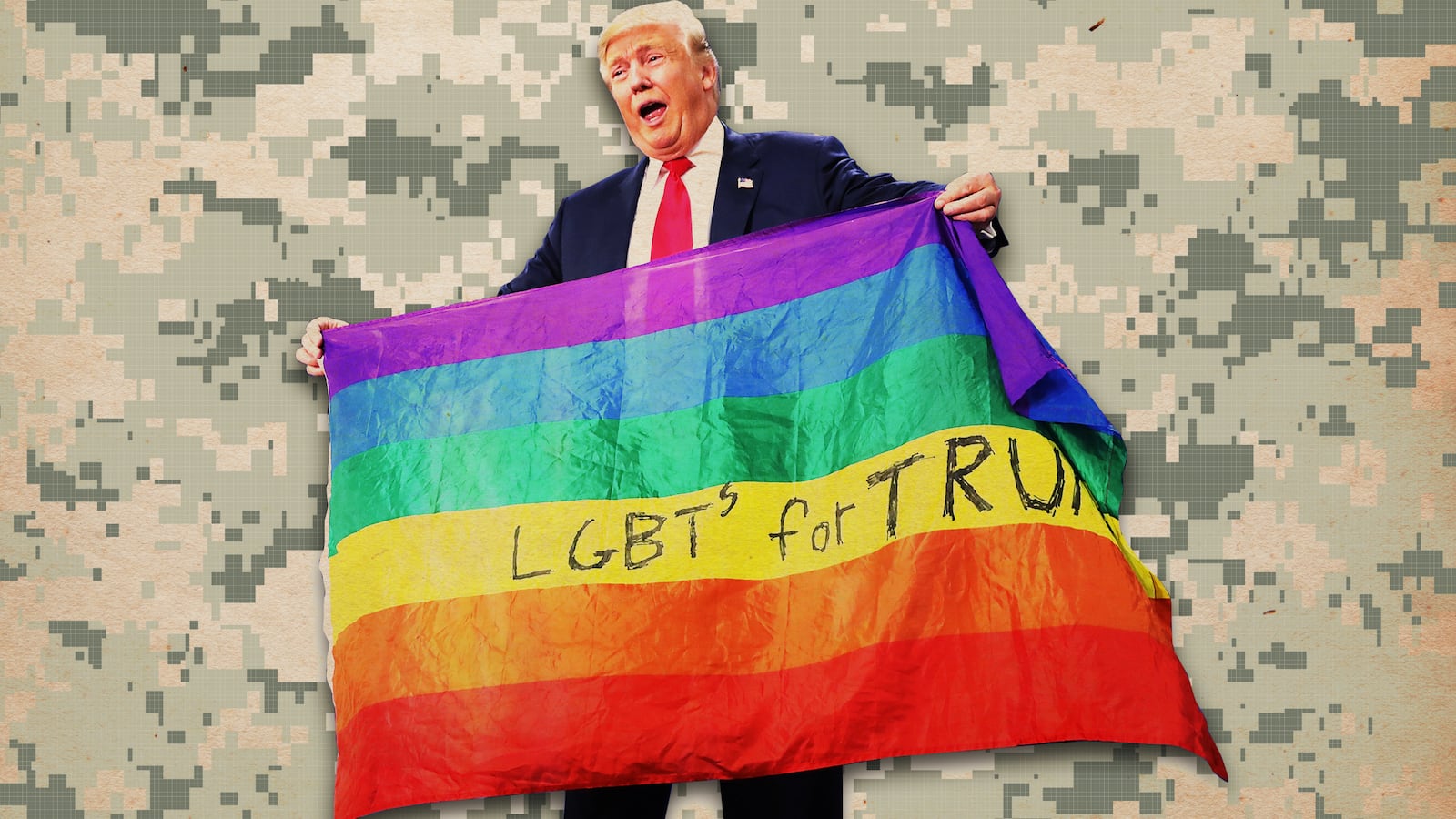The Trump administration on Monday doubled down on its unusual argument for the transgender troop ban: Transgender people can still serve—by not transitioning.
Appearing before the D.C. Circuit Court on Monday to appeal one of the injunctions against the service ban, Department of Justice Attorney Brinton Lucas maintained that if Defense Secretary James Mattis’ policy were implemented, transgender troops technically would not be “discharged on the basis of their transgender status.”
“But under the Mattis policy, they would have to identify with their biological sex to remain in the military, right?” the court asked.
“That is true, your honor,” Lucas confirmed, before continuing his argument.
In essence, that would mean transgender people in the military would only be allowed to serve if they refrain from undergoing transition-related medical care—care that virtually every major medical association has affirmed can be medically necessary and, indeed, life-saving for transgender people.
This has been the Trump administration’s position ever since Secretary Mattis revised the president’s original policy—which was announced last summer on Twitter to the surprise of top Pentagon officials—in an attempt to shift focus away from transgender identity itself to gender dysphoria, or the psychological disjuncture between one’s gender and one’s birth-assigned sex, as a disqualifying medical condition.
LGBT legal advocates have maintained that, because transgender people by definition do not identify with their birth-assigned sex, the net effect is the same: Trump wants to give transgender troops the boot.
The DOJ and LGBT leaders argued that point on Monday before the D.C. Circuit Court as the judges sought to determine whether Mattis’ revised policy was substantially different from the Trump administration’s original ban.
But Judge Thomas B. Griffith, in particular, used the hearing to seek clarification from Lucas as to how the DOJ could expect transgender people to serve in the military as their birth-assigned sex—and still claim they’re not banning them outright.
“As I understand it, you’re saying there are transgendered individuals in the military who can serve consistent with their biological sex,” Judge Griffith asked Lucas. ‘But don’t they have to suppress the very nature of their transgender condition to do that?”
Lucas’ response to that Monday was, effectively, that because some transgender people do not seek any transition-related health care beyond “psychotherapy,” a ban based on whether a service member seeks clinical treatment for gender dysphoria is not the same as a categorical ban on transgender troops.
Lucas even cited the existence of non-binary transgender people—some of whom do not seek out transition-related health care—to argue that Mattis’ revised policy was not completely transgender-exclusive.
“There are some transgender individuals who identify as non-binary or genderfluid and so the concept of gender transition has no meaning for these individuals,” Lucas claimed—despite the fact that many non-binary people do describe their experience shifting to a life outside binary gender categories as a transition, and many do, in fact, seek out transition-related medical treatments. (The military would currently require any non-binary transgender person to serve as their birth-assigned sex.)
And the central fact remains: The Trump administration wouldn’t allow thousands of transgender men and women—those who do have a binary gender identity—to serve in the military unless they are living as the sex they were assigned at birth. In that sense, the military would only be adding to the social forces that already discourage people from transitioning until later in life.
“The reality is that transgender people sometimes don’t transition or transition later in life because of discrimination and social pressures,” Jennifer Levi, director of the GLBTQ Legal Advocates and Defenders’ Transgender Rights Project and one of the attorneys in the case, told The Daily Beast. “And they certainly shouldn’t have to face that kind of discrimination from their country when all they’re seeking to do is serve.”
Levi argued Monday that it was cruel to expect transgender people to live as their biological sex, arguing that “a requirement that someone suppress their identity is not an exception to a ban,” while also fielding several questions from Judge Stephen F. Williams, who seemed more sympathetic to the government’s argument.
Levi told The Daily Beast that Monday’s hearing “was a very important educational moment to really address the reality of transgender people’s lives and be able to explain why requiring a transgender person to live in their birth sex is discriminatory and cruel, and why it ultimately harms the military to have that kind of policy.”
A recent review of peer-reviewed literature on the effects of transition for transgender well-being from Cornell University’s What We Know Project concluded that transition “can significantly improve the well-being of transgender individuals,” and that, conversely, “transgender individuals” who cannot access treatment “are more likely than the general population to experience health challenges such as depression, anxiety, suicidality, and minority stress.”
In that sense, LGBT advocates say, the Mattis policy would effectively require transgender people in the military to risk their mental health to keep their jobs.
In response to questions from The Daily Beast, a DOJ spokesperson maintained that Mattis’ revised policy was not a transgender troop ban per se: “The Mattis policy holds that transgender persons should not be disqualified from service solely on account of their transgender status.”
“The standards proposed by Secretary Mattis would disqualify applicants with a history of gender dysphoria or medical treatment associated with gender transition—unless the applicant meets certain medical criteria,” the spokesperson continued.
While legal challenges over the injunctions on the transgender troop ban are ongoing, the Trump administration separately asked the Supreme Court on Black Friday to grant review in the case before the circuit-level courts have issued their final rulings.
If the government’s circuit-level appeals fail, transgender people will continue to be able to serve openly—as their gender—while the case heads to the highest court.







